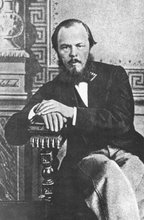 and for a shunning of grand systems. His essay looks at Tolstoy and Dostoevsky as examples of prosaic writers who bring for us the "messiness of the world," unlike epics, lyrics, tragedies or romances. Freud, for example, he argues, was a "system" man: for Freud, even forgetting is part of a system, albeit hidden: there are no accidents for Freud. Morson thinks this is not the way the world is -- for him, it's a mess, its natural state is disorder, and any order found in it, "is always the result of work" and "requires an explanation." Contingencies are the world. Dostoevsky, Morson says, believed that the world was driven by "sudden eruptions from the unconscious," a rather Freudian idea, while Tolstoy believed that our choices are shaped by the "whole climate of our minds, which themselves result from countless small decisions at ordinary moments." Morson says that Anna Karenina's life was destroyed, because she lacked the ability to grasp the prosaic; she insisted on living on another scale, in a big system, and the loneliness of it killed her: as Morson says, "she dies from a lack of prosaics."
and for a shunning of grand systems. His essay looks at Tolstoy and Dostoevsky as examples of prosaic writers who bring for us the "messiness of the world," unlike epics, lyrics, tragedies or romances. Freud, for example, he argues, was a "system" man: for Freud, even forgetting is part of a system, albeit hidden: there are no accidents for Freud. Morson thinks this is not the way the world is -- for him, it's a mess, its natural state is disorder, and any order found in it, "is always the result of work" and "requires an explanation." Contingencies are the world. Dostoevsky, Morson says, believed that the world was driven by "sudden eruptions from the unconscious," a rather Freudian idea, while Tolstoy believed that our choices are shaped by the "whole climate of our minds, which themselves result from countless small decisions at ordinary moments." Morson says that Anna Karenina's life was destroyed, because she lacked the ability to grasp the prosaic; she insisted on living on another scale, in a big system, and the loneliness of it killed her: as Morson says, "she dies from a lack of prosaics." Evil, says Morson, is often depicted as "grand, terrifying and Satanic," but in Tolstoy, Chekov and Dostoevsky, evil is petty, even prosaic. Ivan Karamazov's Devil is petty, commonplace; even his hell has adopted the metric system - - the Karamazov hell is measured in millimeters. Goodness is also measured in millimeters, Morson argues. He explains that a "system" of ethics can lead to avoidance of responsibility and wrong choices in a contingent world. Rather, he argues that only a constant wielding of "moral alertness" to the small choices that life is made of, the tiny instances of "oughtness" (Bakhtin's word) that compose our moral decisions and direct our acts, which always take place in a complex world in all its messiness, will lead to a life lived ethically. "For such reasons," he writes, "Bakhtin came to regard the novel as the highest art form . . . more profound than philosophy. In great novels the texture of daily life is described with a richness, depth and attention to contingent particulars that no other form of thought or literary genre offers. In novels we see moral decisions made moment by moment by inexhaustibly complex characters in unrepeatable social systems at particular historical times: and we see that the value of these decisions cannot be abstracted from these specifics." He describes how great prosaic novels like "The Brothers Karamazov" teach us, through the "moment-to-moment decisions we make in the course of reading." Our moment-by-moment moral assessments of the actions portrayed are a form of "practice" for making complex moral decisions in the disordered, bumptious real world. These practice runs are far more instructive and seep more deeply into our consciousnesses than mere ethical or moral "instruction." Morson reiterates Tolstoy's thoughts about the "ethics of reading." It is not important what the "explicit" moral of the passage or the novel might be, but rather how the work "infects" the reader as they read, "practicing" making moral choices moment-to-moment, and making "tiny, tiny alterations of consciousness in the process."
Image credit: 1) Photograph of Gary Saul Morson, complements of the Slavic Department, Northwestern University, Chicago. 2) Painting by Mary Pratt, "Raspberries Reflecting Summer." Oil on canvas, 61 x 91 cm. 2000. Courtesy Gallery Stratford; in a private collection. The berries on a plate appear to be the very best berries ever, and that is because they are a work of genius by the Newfoundland painter, Mary Pratt, consummate artist of the still life.
